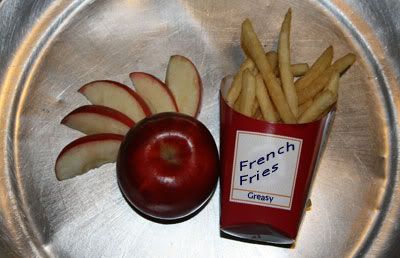
Many behaviors and lifestyle choices of abuse survivors are energized by the issues of power and control. When you're abused, someone misuses their power and control over you. With that misuse, they take away YOUR power and control, which - in turn - can send you on a lifelong search for enough power and control to not ever feel threatened or small or vulnerable again.
When sexual or physical abuse happens, the victim's body experiences sensations - such as pain and even pleasure - that are completely out of your control. This can create a deep (and false) sense that the body has betrayed you by being weak, small, powerless, or sexual, which can set you up for a lifetime of unhealthy habits and practices.
One common area of difficulty is with food. This difficulty can run the gambit. For some, there is virtually a practice of deliberate starvation, which is commonly known as anorexia. For others, there is a practice of deliberate gluttony, over-eating which can lead to obesity. For others, there is the practice of binge eating and then purging, bulimia - a pattern of blinding gratification followed by blinding punishment and regret. There are some who are so afraid of going without food that they hoard it and even hide it in every possible nook and cranny of their homes, vehicles, and work. To the outside person looking in, these unhealthy ways of dealing with appetite and food make no sense. That may even be true for you - you don't understand why you have such a difficult relationship with food.
If you scratch beneath the surface of your eating patterns, it is about much more than food. It is about power and control. When you had no power and control over what happened to your body during abuse, then there is nothing more powerful than to exercise complete control over it NOW with your food habits! Of course, because - like everything else - your food habits formed around traumatic experiences (such as abuse) - then how you view food and your body are distorted by that trauma - that awful sense of having no control.
It bears mentioning that abuse survivors are most often people of extremes. We tend to be all-or-nothing kind of people. Rather than enjoying food in a healthy and balanced way, it's either starvation or gluttony. It's either way too much or way too little. One of the most vicious cycles with food is the horrid sense of losing control - of overeating, feeling shame, and then either eating more or starving more or vomiting because shame has triggered an attack of hopelessness.
These feelings of being overwhelmed, of being ashamed, of rigid control, can cause your relationship with food to be so dysfunctional that you do further harm to your body and to your general health. Of course, that can subsequently impact your emotions and can lead to depression, irritation, and even anger that can go sideways.
Your body is yours. To overindulge, under indulge, or both, is you way of trying to exercise control over what happens to it. Personal empowerment results when you recognize that you have as much of a relationship with food as you do with your family and friends. Food is a significant part of your life that must be managed with balance and respect. Respect for yourself and respect for the body you put it in.
Another contributing dilemma is the culture that many of us live in. It has cultivated a very unhealthy environment for food and its consumption. We're bombarded with all-or-nothing advertisements that have skinny people munching on 2,000 calorie burgers. We have healthy looking children exclaiming how awesome junk food is. We even have entire television networks dedicated to food preparation - but not just preparation. There are a remarkable number of programs on where we literally watch people going to restaurants, eating and commenting. It's almost like pornography!
I think it's easy to eat (or not eat) when you're on auto-pilot, when you do what you do without thinking. Food - and your relationship to it - is a difficult thing to be functional with, particularly for abuse survivors. The thinking goes something like this: “It doesn't matter. Why bother when I've been like this for so long. I'll do better tomorrow, this one time won't matter.” Of course, it does matter, because this is not about food. It's about power and control - and your attempt to exert control over something very personal, but doing so in a dysfunctional way.
Every bite counts. Too many or too few - they count. The WAY they count is that they reflect your own beliefs about your worth, your body, and your health. That’s where your attention and evaluation need to begin.



No comments:
Post a Comment